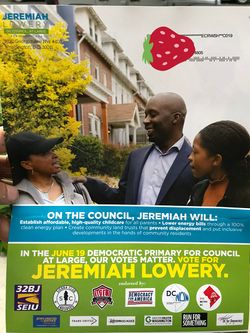Jeremiah Lowery
Jeremiah Lowery ran for DC Council at Large in 2018 and lost.[1],[2]
Endorsing Keith Ellison
Millennial Leaders Endorse Keith Ellison for DNC Chair was posted February 2017.
Young people have been at the forefront of every major struggle in our country to make real the promise of democracy. During the last election cycle, our generation played a pivotal role in bringing economic and racial justice to the forefront of political dialogue, and now we are marching in the streets, rallying at airports, and at town halls resisting Donald Trump’s cabinet and his agenda of hatred and greed.
That’s why we endorse Representative Keith Ellison for DNC Chair. We believe he can activate the millennial base of the party by working with the movements we have powered.
Signatories included Jeremiah Lowery, Steering Committee, DC for Democracy.
Endorsments
Jeremiah Lowery has been endorsed by Democracy for America, Run For Something, National Organization for Women-DC Chapter, Vote Pro Choice, Jews United For Justice Campaign Fund, SEIU 32BJ, Trans United, Washington DC Teachers’ Union, Metro DC Democratic Socialists of America, Sierra Club — DC Chapter, 350.org-DC Chapter DC Tenants Advocacy Coalition, and Greater Greater Washington.[3]
Metro DC DSA Public Facbook group
Members of the Metro DC Democratic Socialists of America, public Facebook group, as of March 12, 2017 included Jeremiah Lowery.[4]
Metro DC DSA local politics
Zachary Eldredge is gearing up for election day. The 26-year-old physics Ph.D. student isn’t running for office, nor is he working on a single specific campaign; he’s working on 11 of them.
Eldredge, a member of the Metro DC chapter of the Democratic Socialists of America since July of 2017, is the core organizer for the political group’s campaign to get some of its members elected as Advisory Neighborhood Commissioners—elected non-partisan neighborhood representatives that advocate to the mayor and Council for their communities.
It’s part of a broader effort to, as the group puts it, “begin the process of strengthening its presence in local government and advocating for socialist policy and meaningful progressive change on the neighborhood level across the District.”
Eldredge sees the local ANC races as a pivotal opportunity. Over the past couple of years, the DSA—the largest organization of far-left progressive and labor-centered socialists in the country—has significantly boosted its profile, highlighted by Alexandria Ocasio-Cortez’s upset victory in the June Democratic primary in New York’s 14th congressional district.
D.C. is an overwhelmingly Democratic city, and the Council’s record on issues often lines up with its progressive makeup: It was one of the first jurisdictions to legalize gay marriage and, just a couple of years ago, passed a bill brought to the table by living wage advocates to incrementally raise the minimum wage to $15 an hour by 2020, one of the highest minimum wages in the country. In 2016, the Council passed a paid family leave bill, which grants new parents—or people who need to care for a sick family member—up to eight weeks of paid leave. At-Large Councilmember Elissa Silverman, one of the body’s most left-leaning members, spearheaded the latter effort.
But neither she nor any of the city’s councilmembers are Metro DC DSA members, and some argue that the Council isn’t as progressive as it thinks it is. In the June primary, two incumbents, Council Chairman Phil Mendelson and At-Large Councilmember Anita Bonds saw a challenge from the left on their progressive records in the form of Ed Lazere, the executive director of the DC Fiscal Policy Institute, and activist Jeremiah Lowery, who is a member of the Metro DC DSA.
Both Lazere and Lowery ran campaigns criticizing their incumbent opponents for their records on addressing D.C.’s affordable housing crisis, transportation issues, and keeping cozy relationships with deep-pocketed developers. Though Lazere is not a member of the Metro DC DSA, he says that because both he and Lowery “come out of the progressive D.C. advocacy crowd,” several organizations—DC For Democracy, Jews United for Justice, and the Trans United Fund—coordinated their volunteers to campaign for them, calling them the “True Progressive” ticket for the primary.
The June primary didn’t see any change in the Council—all of the incumbents won reelection—but both Lazere and Lowery’s results were significant: Lazere, who was Mendelson’s only challenger, pulled in 36.38 percent of the votes; while Lowery, who ran against Marcus Goodwin in addition to Bonds, came in second in his race with 23.58 percent of the votes.
"Where Do We Go From Here?"
Institute for Policy Studies' Phyllis Bennis joined a line up of special guests for an inter-generational teach-In on the triple evils of militarism, economic exploitation, racism, January 18 2016, 5th and K Busboys & Poets. Washington DC.
- At this tribute to Dr. Martin Luther King, Jr. the discussion will tease out the role of popular culture: 60s vs. now, the international implications of Dr. King’s Vision, and the links between economic exploitation and racism.
Participants included: Dr. Clarence Lusane, Joni Eisenberg, Rev. Graylan Hagler, Medea Benjamin, Phyllis Bennis, Dr. Vanessa Wills, Jeremiah Lowery, Dr. Maurice Jackson, Frank Smith, Dave Zirin, Jay Mills, Ayanna Gregory, In Process, and Live Audience Participation from Busboys!
Co-Moderators: Youth Activist Princess Black and Dr. Greg Carr, Howard University.[5]
